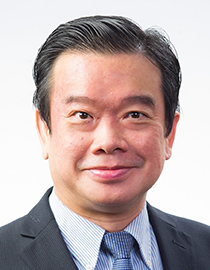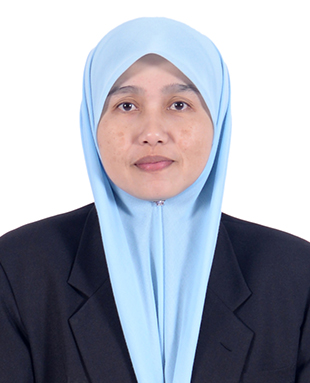| Prof. SIAU, Keng LengSingapore Management University, Singapore Introduction: |
| Associate Professor Anazida ZainalUniversiti Teknologi Malaysia (UTM), MalaysiaIntroduction: Associate Professor Dr. Anazida Zainal is a renowned academician and researcher specializing in cybersecurity at the Faculty of Computing, Universiti Teknologi Malaysia (UTM). As a member in an Information Assurance and Security Research Group (IASRG), her research mainly focuses on advancing knowledge and developing innovative solutions in Cyber Threat Intelligence, Security Analytics, Network Security, and Anomaly Detection. With a strong foundation in computer science, she earned her Ph.D. in Computer Science specializing in Network Security from UTM in 2011, after completing her MSc in Computer Science at UTM in 2000 and her BSc in Computer Science from Rutgers University, New Jersey, USA, in 1990. Dr. Anazida has made significant contributions to the field of cybersecurity through her extensive research, scholarly publications, and collaborations with both academic institutions and industry partners. Through her active collaboration with the industry, several cybersecurity-related laboratories have been established at the Faculty of Computing, including the UTM-NFCC Anti-Financial Crime Lab (AFC Lab), the Security Operations Center (SOC Lab), and the UTM-CSM Cyber Threat Intelligence (CTI Lab). These labs serve as vital hubs for research, innovation, and hands-on training in cybersecurity, fostering industry-academia partnerships to address emerging digital security challenges. Her dedication to teaching and research has earned her recognition as a respected figure in cybersecurity education. Beyond academia, Dr. Anazida actively collaborates with government agencies, industry leaders, and professional bodies to address real-world cybersecurity challenges. Abstract:Financial crime is evolving rapidly, with fraudsters leveraging advanced techniques to exploit vulnerabilities in digital systems. As threats become more sophisticated, artificial intelligence (AI) offers powerful solutions to detect, prevent, and mitigate these risks. |
| Dr. - Ing. Tai Fei (Interim Professor)Dortmund University of Applied Sciences and Arts, Germany Introduction: Tai Fei (Senior Member, IEEE) is an Interim Professor of Computer Vision and Robotics at Dortmund University of Applied Sciences and Arts, Germany. He holds a B.Eng. in Telecommunication Engineering from Shanghai Maritime University, China (2005), and both Dipl.-Ing. and Dr.-Ing. degrees in Electrical Engineering and Information Technology from Darmstadt University of Technology (TUD), Germany (2009 and 2014, respectively). From 2009 to 2012, he was a Research Associate at Hochschule Bremen, where he contributed to pioneering research on underwater mine detection using sonar imagery in collaboration with TUD. In 2013, he joined the University of Bremen, where he further expanded his expertise in signal processing. Between 2014 and 2023, he worked as a Development Engineer at HELLA GmbH & Co. KGaA, playing a key role in advancing automotive radar signal processing and sensing technologies. Since November 2023, he has been with Dortmund University of Applied Sciences and Arts. His research interests include signal processing, environment perception, robotics, and automated systems. He has authored or co-authored over 80 publications, covering leading journal and conference papers as well as industrial patents. Actively engaged in the academic community, he serves as an Associate Editor for both the IEEE Sensors Journal and IEEE Access and has reviewed over 500 publications for prestigious venues. He was also the Lead Guest Editor for the IEEE Sensors Journal's special issue on "Smartness and Robustness of Spatial Environment Perception in Automated Systems." Dr. Fei is extensively involved in organizing and contributing to international conferences and workshops. He co-chaired special sessions at the IEEE Radar Conference 2023 and IEEE SAM 2024. In 2024, he serves on multiple program committees, including the International Program Committee of the 17th International Conference on Sensing Technology (ICST 2024) in Sydney, Australia, the Technical Program Committee of the 2024 International Conference on Electronics, Communication, and Automation in China, and the Scientific Committee of the 3rd World Symposium on Materials Sciences and Engineering 2024 (HYBRID), where he is also a Session Chair and Invited Speaker. Looking ahead to 2025, he will chair a special session at the 33rd European Signal Processing Conference (EUSIPCO 2025) and serve as Co-Chair of the Technical Program Committee for the 5th International Conference on Computer Vision, Applications, and Algorithms (CVAA 2025). As Lead Guest Editor, he is also organizing the special issue on "Advances in Signal Processing for Automotive Radar: Robustness, Performance, and Emerging Techniques" in the EURASIP Journal on Advances in Signal Processing (JASP), collaborating with six distinguished professors from Germany and the USA. Among his notable achievements, he co-authored the award-winning paper "An Improved Stepped-Frequency PMCW Waveform for Automotive Radar Applications," which received the Best Paper Award at GeMiC 2024. Speech Title: PMCW Radar for Automotive Applications: Advancements, Challenges, and Future Perspectives Abstract: Automotive radar technology is rapidly evolving to meet the demands of advanced driver assistance and autonomous systems, and Phase-Modulated Continuous Wave (PMCW) radar has emerged as a promising candidate. Motivated by the benefits of Multiple-Input Multiple-Output (MIMO) radar configurations, PMCW radar significantly enhances multi-target resolution and robustness against mutual interference. However, several challenges must be addressed to fully harness its potential in dynamic automotive environments. This keynote speech examines the critical issues of Doppler compensation and the high-speed Analog-to-Digital Converter (ADC) sampling requirements. I will discuss innovative techniques developed to mitigate the Doppler effect, ensuring accurate target velocity estimation despite rapid vehicular motion. Additionally, the talk will highlight our novel solutions to manage the stringent fast ADC sampling rate demands, which are crucial for capturing high-bandwidth signals without compromising system performance. Looking forward, the integration of few-bit ADCs in PMCW radar systems is being explored as a pathway to reduce hardware complexity and power consumption while maintaining robust performance. Together, these advancements promise to propel automotive radar technology into a new era of safety and efficiency in intelligent transportation systems. |



